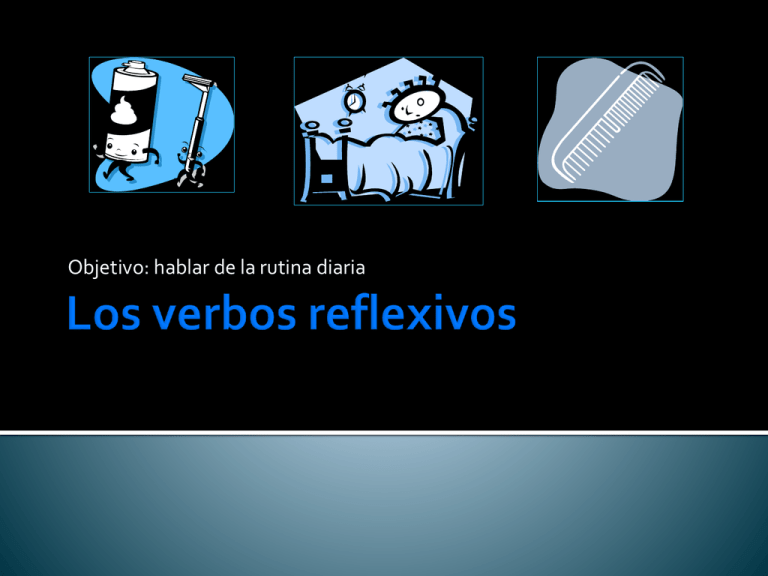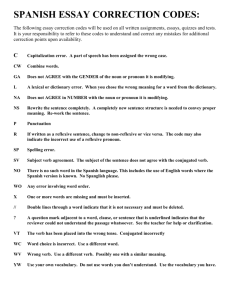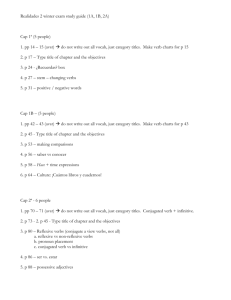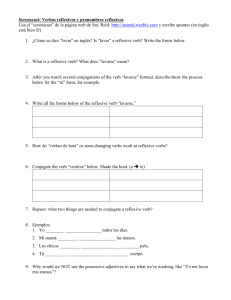Open this presentation (PowerPoint PPTX - 344KB)
advertisement

Objetivo: hablar de la rutina diaria You have already used one reflexive verb in this course. Remember “Me llamo…” to tell your name? It literally means “I call myself…”. If you call yourself a particular name it is a reflexive action. If you call someone on the phone it is not a reflexive action. Me llamo Juan. Mucho gusto. It is a verb indicating that someone does something to themselves. The subject receives the action of the verb. Example of a reflexive verb in English. Juan shaves himself. No, he is washing the clothing. Yes, someone is washing his or her own hands. No, the vet is combing the dog. No, someone else is shaving the man. Yes, she is combing her own hair and looking at herself in the mirror. No, the dad is bathing the baby because he is too little to bathe himself. Yes, he is shaving himself. Regular infinitive verbs end in either –ar, -er or –ir. A reflexive infinitive verb ends in –ar, -er or –ir –but also has –se at the end. An example of a reflexive infinitive verb is “maquillarse”-to put make on oneself Objective…talking about daily present activities Objective…talking about daily present activities Here are some common reflexive verbs. acostarse (ue) to go to bed, to put oneself to bed afeitarse o rasurarse to shave oneself bañarse to bathe oneself despertarse (ie) to wake up, wake oneself up levantarse to get up (literally lift oneself) lavarse to wash oneself ducharse to shower oneself cepillarse o lavarse los dientes to brush one’s teeth maquillarse to put on makeup on oneself peinarse to comb one’s hair myself = me ourselves = nos yourself = te yourselves = os yourself = se himself = se herself = se yourselves = se themselves = se themselves = se Each reflexive pronoun on the right corresponds by color and position with the subject pronouns on the left. yo nosotros me nos tú vosotros te os él ella Ud. ellos ellas Uds. se se 1.) Ignore the “se” or in your head take the “se” off of the verb. Llamarse goes to llamar 2.) find the subject (who is doing the action). Yo 3.) find the refelexive pronoun to match the subject me 4.) conjugate your verb as you usually do *Take off the last 2 letters and then add the appropriate ending. llamo 5.) Put it together. (Yo) Me llamo. Objective…talking about daily present activities Samuel se baña. Samuel bathes himself. Conjugate the reflexive verbs on the next slide to the present tense. Objective…present daily activities Conjugate the verbs in the present tense. 1.) ellos: lavarse 2.) yo: afeitarse 3.) nosotros: acostarse 4.) tú: bañarse 5.) Uds.: levantarse 6.) él: lavarse 7.) ella y yo: peinarse 8.) ellas: maqillarse se lavan me afeito nos acostamos te bañas se levantan se lava nos peinamos se maquillan You conjugate the first verb and leave the second verb in the infinitive form (ends with the letter -r) when two verbs are immediately back to back. Ejemplo…Quiero hacer la tarea. (I want to do the homework.) ir+a+infinitivo *going to do… pensar+infintivo *to intend, plan to do… necesitar+infinitivo *to need to do… querer+infinitivo *to want to do… deber+infinitivo *should do… tener+que+infinitivo *have to do… The first verb is conjugated according to the subject. The second verb is left in the infinitive form. Choose the reflexive pronoun according to the subject. If there are two verbs there are two places to put the reflexive pronoun. 1.) before the conjugated verb 2.) immediately attached to the infinitive verb. Me voy a cepillar después de comer. Voy a cepillarme después de comer. *Notice the possible positions of the blue reflexive pronoun. 1.) before the conjugated verb 2.) immediately attached to the infinitive verb. Translate the sentences using both reflexive pronoun positions and a double verb sentence in the present tense. Objective…talking about daily present activities I need to wash my hands. Objective…talking about daily present activities (Yo)Me necesito lavar las manos. (Yo)Necesito lavarme las manos. Objective…talking about daily present activities He is going to shower. Objective…talking about daily present activities (Él) Se va a duchar. (Él)Va a ducharse. When are reflexive verbs used? Where do reflexive pronouns go if there is one verb? What two places can reflexive pronouns go if there is a double verb sentence? If there are two verbs, which verb is conjugated? (1st or 2nd) Which is in the infinitive form? (1st or 2nd) When are reflexive verbs used? When someone does something to themselves or when the subject receives the action of the verb. Where do reflexive pronouns go if there is one verb? Before the conjugated verb. What two places can reflexive pronouns go if there is a double verb sentence? Before the conjugated verb or attached to the infinitive verb. If there are two verbs, which verb is conjugated? (1st or 2nd) Which is in the infinitive form? (1st or 2nd)?







